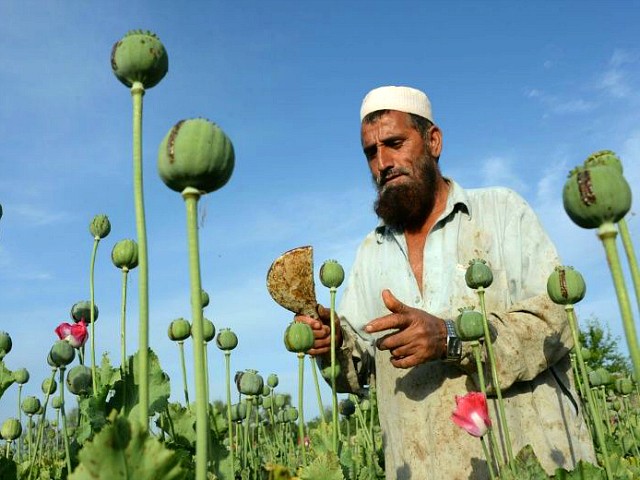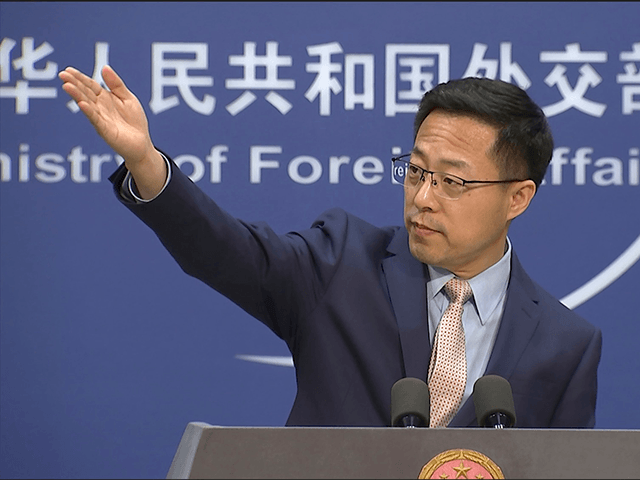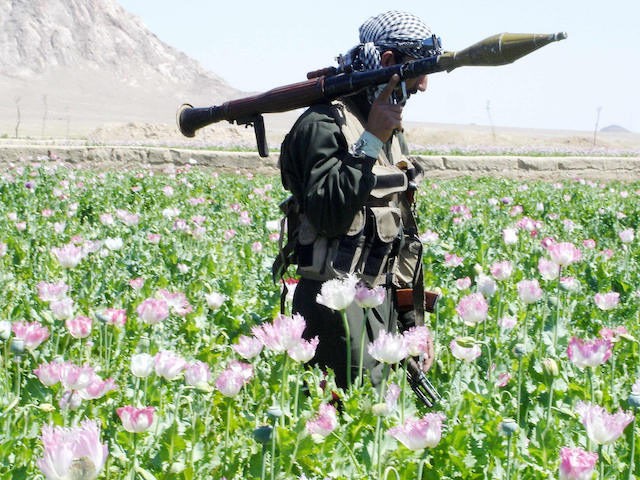The Chinese Foreign Ministry on Thursday blamed the United States for Afghanistan’s vast narcotics industry and demanded the U.S. government should “apologize and compensate for its dishonorable role in the Afghan drug problem.”
The tirade was unleashed by Foreign Ministry spokesman Zhao Lijian in response to a question from reporters about the Taliban’s alleged ban on opium poppy cultivation.

An Afghan farmer harvests opium sap from a poppy field in the Chaparhar district of Nangarhar province on April 19, 2016. (AFP PHOTO / NOORULLAH SHIRZADA)
After thumping his chest about China’s firm opposition to narcotics, “a common scourge of mankind,” Zhao claimed the U.S. conjured the Afghan drug industry into existence during its 20-year occupation, either by criminal neglect or as part of a deliberate U.S. military project to spread drug addiction around the world:
It is worth pointing out that the U.S., the culprit of the Afghan issue, played an ignominious role in the narcotics problem in Afghanistan by acquiescing or even participating in drugs production and trade there. According to some media reports, the U.S. forces stationed in Afghanistan implemented a project to create a drug laboratory on a global scale. As a result, the production of opiates in the country increased more than 40 times. Alfred McCoy, an American historian, said in an article that to fight the Soviet Union in Afghanistan, the U.S. generously funded local guerrillas through the CIA, turning a blind eye to the fact that they were operating a chain of heroin laboratories. Charles Cogan, former director of the CIA’s Afghan operation, said that the U.S. didn’t really devote resources to an investigation of the drug trade in Afghanistan.
The two decades of U.S. presence in Afghanistan is two decades of death and displacement of innocent Afghan civilians and two decades of unchecked local drug proliferation. With its irresponsible and hasty withdrawal, the U.S. has left behind a series of grim challenges to the innocent Afghan people, including the drug issue. The U.S. should reflect on its behavior, offer sincere apologies and ample compensations, and strive to undo the harm it has inflicted on the Afghan people with concrete actions.

Chinese foreign ministry spokesperson Zhao Lijian gestures during a press briefing in Beijing on Monday, Nov. 23, 2020. (AP Photo/Liu Zheng)
In truth, the Afghan drug trade long predates the U.S. invasion of 2001. The United Nations demanded the elimination of poppy cultivation and heroin production in December 2000, at which point Taliban-controlled Afghanistan was internationally recognized as the world’s largest producer of illegal opium. The drug trade was identified as a major factor in Afghanistan’s chronic food shortages because so much of the country’s farmland was devoted to growing opium poppies.
The Taliban profited enormously from taxes it levied on the billion-dollar illegal drug trade, both before and after the U.S. invasion. In 2021, the U.S. Special Inspector General from Afghanistan (SIGAR) estimated the Taliban obtained roughly 60 percent of its annual income from narcotics, reaping hundreds of millions of dollars per year.
Contrary to Zhao’s ravings, SIGAR reported the U.S. spent over $8.6 billion between 2002 and 2017 attempting to eliminate the Afghan drug trade — sadly, without any “lasting impact.” Counter-narcotics was considered a “priority” under the Bush administration but was de-emphasized by both American and Afghan officials after 2008 as attention was focused on fighting the Taliban insurgency.
Like much of what transpired in Afghanistan during the U.S. occupation, the anti-drug effort was often disorganized, mismanaged, and self-defeating, but it was indisputably made; in the latter years of the occupation, American and Afghan government forces tried eliminating drug labs with airstrikes, but the labs were too easily relocated or replaced, and the danger of collateral damaged was too high.
Zhao is the Foreign Ministry spokesman who took point on spreading China’s deranged conspiracy theory that the Wuhan coronavirus was created in a U.S. military laboratory in Ft. Detrick, Maryland, and deliberately spread to China by American soldiers.
Perhaps not coincidentally, the first question fielded by Zhao at his Thursday press conference concerned the Metallurgical Corp of China singing a deal with the Taliban to restart the copper mine at Mes Aynak, where an ancient Buddhist city of great archaeological significance is inconveniently sitting atop a vast and profitable copper deposit.
Zhao insisted the deal did not change the Chinese government’s position on formally recognizing the legitimacy of the Taliban regime. Beijing has been signaling its eagerness to do business with the Taliban and exploit Afghanistan’s mineral resources, while coming up just short of formal diplomatic recognition, which would be strongly denounced by much of the international community.
Two of the biggest hurdles to China’s blossoming business relationship with the Taliban are suspicions that the new rulers of Afghanistan remain willing to harbor Muslim extremists who threaten China’s security interests, and the drug trade. China, happy to export deadly fentanyl to the rest of the world, sees drug abuse as a menace to its own population, and the highly profitable drug trade as a threat to its border security.
China’s state-run Global Times decided Zhao’s latest unhinged rant was an opportunity to remind readers that “over 421,000 netizens” signed its online petition demanding the United States give all of Afghanistan’s frozen financial assets to the Taliban.

COMMENTS
Please let us know if you're having issues with commenting.